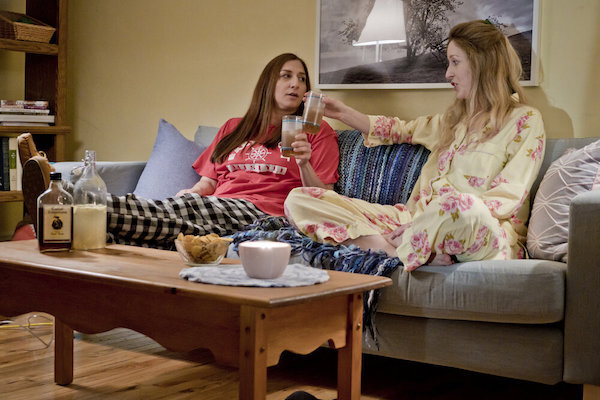The coming-of-age rite of passage is so often reserved for teenagers transforming from children into adults, but the process of coming to terms with your identity and finding new meaning is one that colours another decade: your 30s. Saint Frances, The Forty-Year-Old Version, I Used To Go Here and Spinster all see complex, uncertain women grappling with the next chapter of their lives with the same mercurial energy as all the teenagers who came before them. Orla Smith investigates the trend.
“It’s the truth, and women should talk about it more often. Wouldn’t be as lonely.” This advice, passed on to 34-year-old Bridget (Kelly O’Sullivan) by her mother in Saint Frances, is specifically about the difficult, sometimes violent emotions that postnatal depression can trigger. But it’s also an elegant summation of the cultural silence that Saint Frances, and other films like it, are filling. “I wanted to write [the film] because it was the first time I felt like I had something unique to say,” O’Sullivan told Seventh Row. She starred in the film and penned the screenplay, while her partner, Alex Thompson, directed it. “I still had a ton of doubt, but it pushed me to learn how to write a screenplay so that I could depict abortion in ways I hadn’t seen before. And also, postpartum [depression], shame, and all of the other things that are in the movie.”
Saint Frances was one of four standout 2020 movies about women coming of age in their 30s, the others being I Used to Go Here, The Forty-Year-Old Version, and Spinster. Women are rarely allowed to ‘find themselves’ in movies unless they’re teenagers navigating the shift from childhood to adulthood – just look at the number of talented actresses funneled straight from YA roles to playing mothers and wives. Hollywood struggles to imagine a woman in her 30s who hasn’t got her shit together professionally or romantically — you’re either a hardened career woman, a stay-at-home mother, or very occasionally, juggling both. Each of these four films centres on a woman in her 30s who, in almost every sense, hasn’t worked out what she wants to do with her life yet, and feels self-conscious that she’s lagging. These films tell the viewer something their lead characters desperately need to hear: you’re not alone.
In a world that often ties a woman’s worth to her romantic life and fertility, these films are a breath of fresh air. Saint Frances focuses on a woman who confidently chooses to have an abortion while working as a nanny. In I Used to Go Here, Kate (Gillian Jacobs) is a recently-broken-up-with book author, while all her old college friends are pregnant and married. The Forty-Year-Old Version is more interested in the professional ups-and-downs of playwright-turned-rapper Radha (writer-director-star Radha Blank) than the romantic subplot that starts to bloom in the second half. And Spinster is an anti-rom-com about romantically frustrated caterer Gaby (Chelsea Peretti), who starts the film desperate to find a partner, but gradually realises her happiness is not dependent on being in a relationship.
All four women start in a place of uncertainty. They feel a pressure to hit certain elusive milestones that feel frustratingly out of reach; Radha and Gaby are also both rapidly approaching 40, and the number looms like an intimidating deadline. Their anxiety is partly self-imposed, and partly piled on by judgemental people around them. Saint Frances opens with a man at a party bemoaning how awful it would be to be 34, careerless, and single – only for Bridget to admit she’s all three. There’s a similar scene in Spinster, which finds Gaby as the only single woman at a couple’s dinner, and a man calls her decision to not have children “selfish.”
Our protagonists can often read between the lines and see people judging them even without biting comments. Kate is made to take a group photo with her pregnant college friends who all cradle their baby bumps, while she awkwardly holds her new novel in front of her belly. For Radha, the signifier of her failure is a 30 Under 30 award that stands in her apartment, reminding her that she hasn’t had a play produced since she won it.
The women of Spinster and The Forty-Year-Old Version search for happiness in all the wrong places – reaching for professional and romantic goals that are outwardly respectable but not personally fulfilling. When Gaby is dumped by her boyfriend on her 39th birthday, she quickly decides to start dating again. She confides in her best friend, “I don’t want to date anymore. I’m done, I’m sick of it, it’s hell.” And yet she can’t stop. What follows is a string of dates with disappointing men, who she only meets because she feels she should. Radha’s love life is secondary to her career, and her professional anxieties push her to get her play, Harlem Ave, produced by any means necessary – even if it means selling out. She trusts her play to the hands of J. Whitman, a white, aging theatre producer who turns her loving depiction of Black Harlem life into poverty porn.
Meanwhile, I Used to Go Here and Saint Frances portray women at a crossroads, who stagnate and escape their problems rather than facing them head on. Kate accepts an invitation to talk at her alma mater, seizing the opportunity to escape her day-to-day life, in which she always feels like she’s a couple of steps behind. She doesn’t even feel fulfilled after publishing her first novel; not only is it a critical and commercial disappointment, but she doesn’t like it either. At least at her old college, the naive students look up to her as a success. Bridget hasn’t even settled on a career path: she floats from one gig to the next, all the while hooking up with a younger man, Jace. Both Bridget and Kate find comfort in their relationships with young people, who they feel they have more in common with than their judgemental peers. The optimism and kindness of this generation is a good influence on them, but also stokes the desire to dwell in their 20s.
The open endings of these films feel quietly revolutionary; the filmmakers have no interest in solving their characters’ problems. Besides Gaby, whose happy ending sees her opening a small restaurant, each woman ends up in a place of career uncertainty: Radha and Kate accept their failures and decide to move on, and Bridget ends her nannying position without another job lined up. Cinema has conditioned us to expect a 30-something woman with relationship troubles to be coupled up by the end of a film, but Kate, Bridget, and Gaby stay single; Radha, the only person who wasn’t seeking a relationship, finds one. Nobody gets exactly what they want, but while they’re looking for it, they learn to value and nurture other parts of their lives they weren’t even paying attention to.
After a multitude of mistakes and revelations, these women are no longer trying to be the people they think others expect them to be. Their stories are still ongoing. When I saw Saint Frances in March last year, I’d never seen a film about a childless, partnerless, directionless woman in her 30s that treated her with such empathy and without pity. By the end of the year – once I Used to Go Here, Spinster, and The Forty-Year-Old Version had warmed my lockdown days – that was no longer the case. These four films make a small, but crucial, step in rewriting the script that tells women their lives will be over by 40.
Orla Smith (@orlamango) is a freelance writer based near London, she is also the Executive Editor of Seventh Row.



